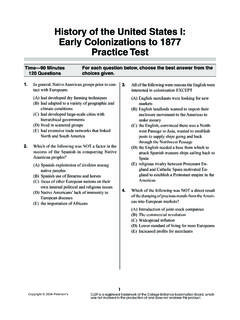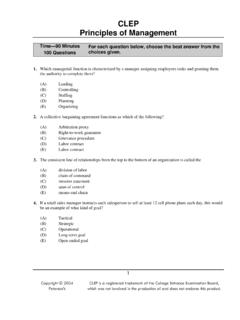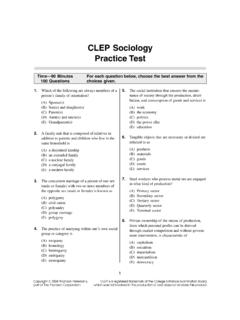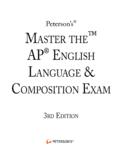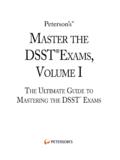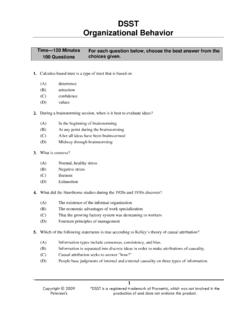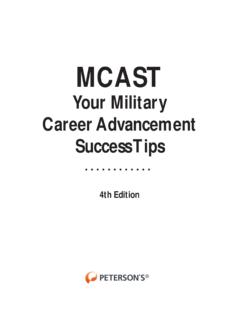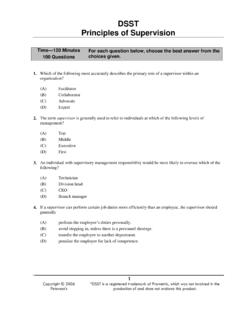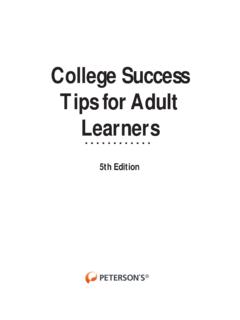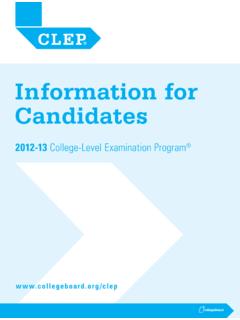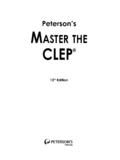Transcription of CLEP Analyzing and Interpreting Literature
1 clep Analyzing and Interpreting Literature 1 Copyright 2004 Peterson's clep is a registered trademark of the College Entrance Examination Board, which was not involved in the production of and does not endorse this product. Time 90 Minutes 80 Questions For each question below, choose the best answer from the choices given. Directions: Questions 1 5 are based on the following passage. Line A thousand ships from Argive land Put forth to bear the martial band, That with a spirit stern and strong Went out to right the kingdom s wrong- 5 Pealed, as they went, the battle-song, Wild as the vultures cry; When o er the eyrie, soaring high, In wild bereaved agony, Around, around, in airy rings, 10 They wheel with oarage of their wings, But not the eyas-brood* behold, That called them to the nest of old; But let Apollo from the sky, Or Pan, or Zeus, but hear the cry, 15 The exile cry, the wail forlorn, Of birds from whom their home is torn- On those who wrought the rapine fell, *unfledged birds; specifically, nestling hawks 1.
2 This passage opens with (A) a sea voyage of musicians (B) a departure of an army by sea (C) an invasion by water (D) a storm at sea (E) ships leaving to pick up their cargo 2. What does the speaker compare to the vultures cry (line 6)? (A) the soldiers singing (B) the conquered people s lamenting (C) the soldiers grieving (D) the gods songs (E) the exiles cry clep Analyzing and Interpreting Literature 2 Copyright 2004 Peterson's clep is a registered trademark of the College Entrance Examination Board, which was not involved in the production of and does not endorse this product. 3. In line 10 the speaker compares bird s wings to (A) feelings of grief (B) airy rings (C) weapons of war (D) the oars of a ship (E) the sea winds 4.
3 In line 17 the word fell is used as a(n) (A) noun (B) adjective (C) intransitive verb (D) transitive verb (E) adverb 5. In the passage, the speaker s metaphor compares the soldiers ships to (A) the gods (B) dying vultures (C) vultures seeking their nests (D) soldiers families (E) songs Directions: Questions 6-10 are based on the following passage. Line JULIET: The clock struck nine when I did send the nurse; In half an hour she promised to return. Perchance she cannot meet him: that s not so. O, she is lame! love s heralds should be thoughts, 5 Which ten times faster glide than the sun s beams, Driving back shadows over louring hills: Therefore do nimble-pinion d doves draw love, And therefore hath the wind-swift Cupid wings.
4 Now is the sun upon the highmost hill 10 Of this day s journey, and from nine till twelve Is three long hours, yet she is not come. Had she affections and warm youthful blood, She would be as swift in motion as a ball; My words would bandy her to my sweet love, 15 And his to me: But old folks, many feign as they were dead; Unwieldy, slow, heavy and pale as lead. O God, she comes! clep Analyzing and Interpreting Literature 3 Copyright 2004 Peterson's clep is a registered trademark of the College Entrance Examination Board, which was not involved in the production of and does not endorse this product. 6. The dramatic situation suggested by this passage is that of a girl (A) dreaming of her absent lover (B) cursing her nurse s sluggish walk (C) waiting for word from her lover (D) hoping that her lover returns her feelings (E) meditating on love 7.
5 In the context of this passage, love s heralds (line 4) means (A) messengers (B) ambassadors (C) announcers (D) forerunners (E) criers 8. Which of the following best summarizes the meaning of lines 9 11? (A) Juliet sees the sun about to set and worries that the nurse may return too late. (B) Juliet watches the sun rise higher in the sky and wonders when the nurse will return. (C) Juliet judges the time of day and calculates how long the nurse has been absent. (D) Juliet is waiting for the sun to rise and for the nurse to return. (E) Juliet marvels at the sun s speed and weighs it against the nurse s slowness. 9. Which of the following assumptions is made in lines 12 13?
6 (A) Love is like a fever. (B) Youth and love motivate people to action. (C) Youths are always in love. (D) The nurse is late. (E) The speaker is in love. 10. In the context of the passage, the word bandy (line 14) means (A) anger (B) love (C) dedicate (D) toss (E) negotiate clep Analyzing and Interpreting Literature 4 Copyright 2004 Peterson's clep is a registered trademark of the College Entrance Examination Board, which was not involved in the production of and does not endorse this product. Directions: Questions 11 15 are based on the following passage. Line Mr. Abraham Adams was an excellent scholar. He was a perfect master of the Greek and Latin languages; to which he added a great share of knowledge in the Oriental tongues; and could read 5 and translate French, Italian, and Spanish.
7 He had applied many years to the most severe study, and had treasured up a fund of learning rarely to be met with in a university. He was, besides, a man of good sense, good parts, and good nature; but was at the 10 same time as entirely ignorant of the ways of this world as an infant just entered into it could possibly be. As he had never any intention to deceive, so he never suspected such a design in others. He was generous, friendly, and brave to an excess; but 15 simplicity was his characteristick: he did, no more than Mr. Colley Cibber, apprehend any such passions as malice and envy to exist in mankind; which was indeed less remarkable in a country parson than in a gentleman who hath passed his life 20 behind the scenes, a place which hath been seldom thought the school of innocence, and where a very little observation would have convinced the great apologist that those passions have a real existence in the human mind.
8 11. In line 7 fund of learning is best paraphrased as (A) money saved for college (B) books and other educational materials (C) knowledge (D) avoided tuition payments (E) education 12. In the context of the passage, good parts (line 9) refers to the character s (A) character and talents (B) physical appearance (C) income and worth (D) temper and faith (E) class and station clep Analyzing and Interpreting Literature 5 Copyright 2004 Peterson's clep is a registered trademark of the College Entrance Examination Board, which was not involved in the production of and does not endorse this product. 13. The author compares Mr. Adams with a country parson in order to (A) highlight his piety (B) stress his humble origins (C) emphasize his naivet (D) reveal his ignorance (E) establish his propriety 14.
9 What passions does the speaker refer to in line 23? (A) malice and envy (B) love and honor (C) fear and courage (D) heat and energy (E) ambition and desire 15. The passage indicates that the speaker perceives Mr. Adams as (A) educated but dull (B) book learned but unworldly (C) astute but uneducated (D) cynical but kind (E) gifted but unmotivated Directions: Questions 16 21 are based on the following passage. Line Chorus NOT marching now in fields of Trasimene, Where Mars did mate1 the Carthaginians; Nor sporting in the dalliance of love, In courts of kings where state is overturned d; 5 Nor in the pomp of proud audacious deeds, Intends our Muse to vaunt his heavenly verse: Only this, gentlemen, we must perform The form of Faustus fortunes, good or bad.
10 To patient judgments we appeal our plaud,2 10 And speak for Faustus in his infancy. Now is he born, his parents base of stock, In Germany, within a town call d Rhodes;3 Of riper years to Wittenberg he went, Whereas his kinsmen chiefly brought him up. clep Analyzing and Interpreting Literature 6 Copyright 2004 Peterson's clep is a registered trademark of the College Entrance Examination Board, which was not involved in the production of and does not endorse this product. 15 So soon he profits in divinity, The fruitful plot of scholarism grac d,4 That shortly he was grac d with doctor s name, Excelling all those sweet delight disputes In heavenly matters of theology; 20 Till swollen with cunning,5 of a self-conceit, His waxen wings6 did mount above his reach, And, melting, Heavens conspir d his overthrow; For, falling to a devilish exercise, And glutted [now] with learning s golden gifts, 25 He surfeits upon cursed necromancy.
